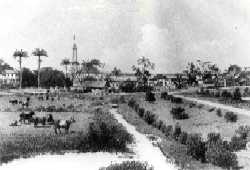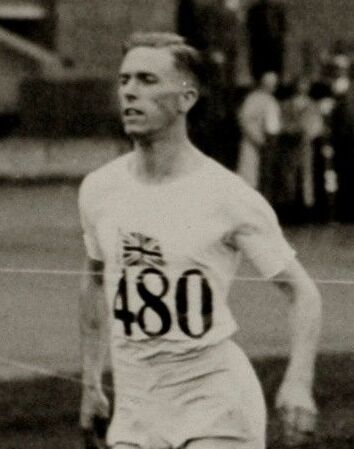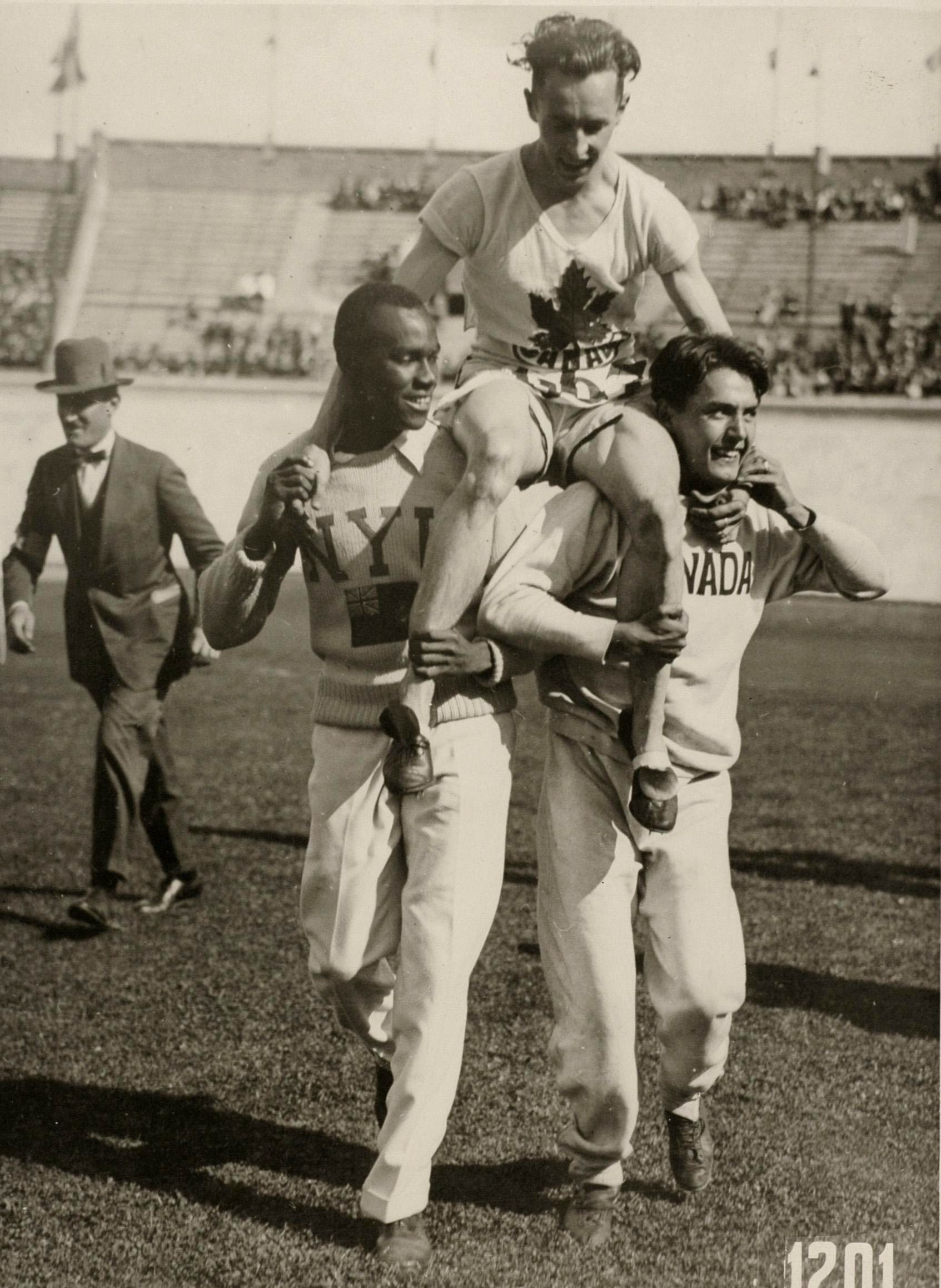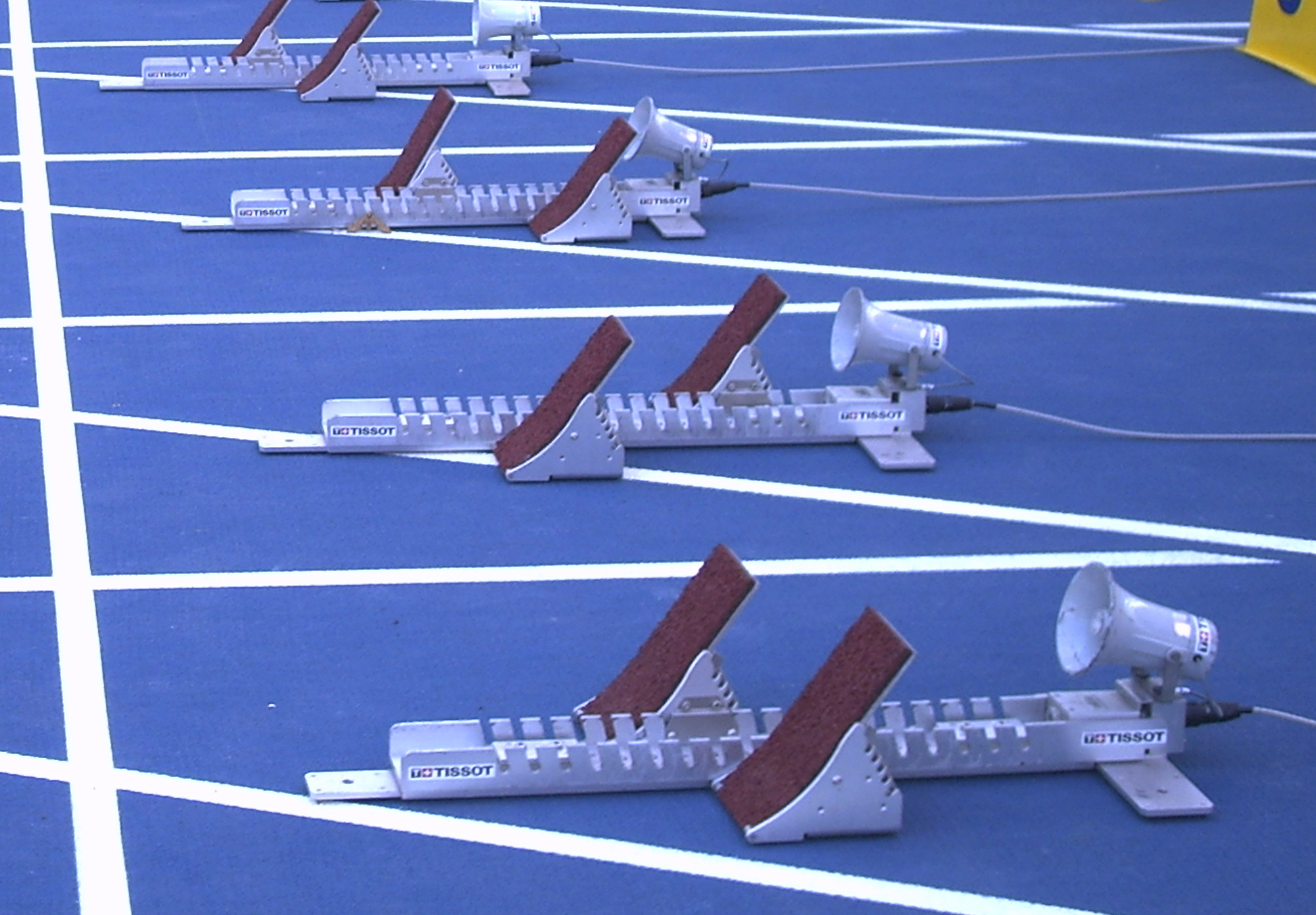|
Jack London (athlete)
John Edward London (13 January 1905 – 2 May 1966) was a British athlete who competed mainly in the 100 metres. Born in British Guiana, now Guyana, he won a silver and a bronze medal at the 1928 Summer Olympics in Amsterdam. He was the second Black British Olympian to win a medal for Great Britain (after Harry Edward, at the 1920 Antwerp Olympics), and the third to represent Great Britain at the Olympics (the first being wrestler Louis Bruce). Early life London was born in Demerara, British Guiana (now Guyana). His father was John Edward London who worked as a school teacher and church minister and later as a medical practitioner. His mother was named Beatrice Annie. They moved to England where John Edward London Snr. was studying medicine. He later returned to British Guiana to practice, while Beatrice and John Edward Jnr. remained in England. They lived with Beatrice's sister in Newcastle-upon-Tyne, at Lily Crescent, in the Jesmond area of the city. When John Edward Snr. ... [...More Info...] [...Related Items...] OR: [Wikipedia] [Google] [Baidu] |
Georgetown, Guyana
Georgetown is the capital (political), capital and largest city of Guyana. It is situated in Demerara-Mahaica, region 4, on the Atlantic Ocean coast, at the mouth of the Demerara River. It is nicknamed the "Garden City of the Caribbean." It is the retail, administrative, and financial services centre of the country, and the city accounts for a large portion of Guyana's GDP. The city recorded a population of 118,363 in the 2012 census. All executive departments of Guyana's government are located in the city, including Parliament Building, Guyana, Parliament Building, Guyana's Legislative Building and the Court of Appeals, Guyana's highest judicial court. The State House, Guyana, State House (the official residence of the head of state), as well as the offices and residence of the head of government, are both located in the city. The Secretariat of the Caribbean Community, Secretariat of the international organization known as the Caribbean Community (CARICOM), with 15 member-stat ... [...More Info...] [...Related Items...] OR: [Wikipedia] [Google] [Baidu] |
Newcastle Upon Tyne
Newcastle upon Tyne, or simply Newcastle ( , Received Pronunciation, RP: ), is a City status in the United Kingdom, cathedral city and metropolitan borough in Tyne and Wear, England. It is England's northernmost metropolitan borough, located on the River Tyne's northern bank opposite Gateshead to the south. It is the most populous settlement in the Tyneside conurbation and North East England. Newcastle developed around a Roman Empire, Roman settlement called Pons Aelius. The settlement became known as ''Monkchester'' before taking on the name of The Castle, Newcastle, a castle built in 1080 by William the Conqueror's eldest son, Robert Curthose. It was one of the world's largest ship building and repair centres during the Industrial Revolution. Newcastle was historically part of the county of Northumberland, but governed as a county corporate after 1400. In 1974, Newcastle became part of the newly-created metropolitan county of Tyne and Wear. The local authority is Newcastle Ci ... [...More Info...] [...Related Items...] OR: [Wikipedia] [Google] [Baidu] |
1932 Summer Olympics
The 1932 Summer Olympics (officially the Games of the X Olympiad and also known as Los Angeles 1932) were an international multi-sport event held from July 30 to August 14, 1932, in Los Angeles, California, United States. The Games were held during the worldwide Great Depression, with some nations not traveling to Los Angeles as a result; 37 countries competed, compared to the 46 at the 1928 Games in Amsterdam, and even then-U.S. President Herbert Hoover did not attend the Games. The organizing committee did not report the financial details of the Games, although contemporary newspapers stated that the Games had made a profit of . Host city selection The selection of the host city for the 1932 Summer Olympics was made at the 23rd IOC Session in Rome, Italy, on April 9, 1923. Remarkably, the selection process consisted of a single bid, from Los Angeles’ Olympic Committee led by Billy May Garland, and as there were no bids from any other city, Los Angeles was selected by de ... [...More Info...] [...Related Items...] OR: [Wikipedia] [Google] [Baidu] |
Amateur Athletic Association
The Amateur Athletic Association of England or AAA (pronounced 'three As') is the oldest national governing body for athletics in the world, having been established on 24 April 1880. Historically it effectively oversaw athletics throughout Britain and Ireland (until 1923). Its role changed to support regional athletic clubs within England alone. This role was effectively taken over by England Athletics in 2005 and the Amateur Athletic Association of England was absorbed into that organisation. It is now concerned with the development of young athletes and has taken on the role of safeguarding the history of the sport and still awards trophies to elite athletes. History Three men from Oxford University, Clement Jackson, Montague Shearman and Bernhard Wise, were responsible for the founding of the Amateur Athletic Association which succeeded the Amateur Athletic Club ("AAC") in 1880. The Amateur Athletic Club had had a narrow definition of 'amateur' and had drafted into its o ... [...More Info...] [...Related Items...] OR: [Wikipedia] [Google] [Baidu] |
Walter Rangeley
Walter Rangeley (14 December 1903 – 16 March 1982) was an English athlete who competed mainly in the sprints. Career Rangeley was born in Salford. He competed for Great Britain in the 1924 Summer Olympics held in Paris, France, in the 4×100 metre relay where he won the silver medal with his teammates Harold Abrahams, Wilfred Nichol and Lancelot Royle. In the 100 metres event he was eliminated in the quarter-finals. Rangeley finished third behind Loren Murchison in the 100 yards event at the 1925 AAA Championships. At the Olympic Games in 1928 held in Amsterdam Rangeley won a silver medal in the 200 metres. He also joined with a new relay team consisting of teammates Cyril Gill, Edward Smouha and Jack London John Griffith London (; January 12, 1876 – November 22, 1916), better known as Jack London, was an American novelist, journalist and activist. A pioneer of commercial fiction and American magazines, he was one of the first American authors t ... which ... [...More Info...] [...Related Items...] OR: [Wikipedia] [Google] [Baidu] |
Edward Smouha
Edward Ralph Smouha (17 December 1908 – 1 April 1992) was a British track and field athlete who competed at the 1928 Summer Olympics. Biography Smouha was born at Chorlton-cum-Hardy, one of the nine children of Rosa Ades and Joseph Smouha. His father was an Iraqi Jew born in Baghdad who emigrated to Manchester, England, and became a successful cotton manufacturer. He later drained swampland outside Alexandria, Egypt to create a new suburb, Smouha City.Rubinstein, William D. (2011)Joseph Smouha ''The Palgrave Dictionary of Anglo-Jewish History''. Retrieved on 2015-01-25. He competed for Great Britain in the 1928 Summer Olympics held in Amsterdam, Netherlands in the 4 x 100 metre relay where he won the bronze medal with his teammates Cyril Gill, Walter Rangeley and Jack London. He studied at Magdalene College, Cambridge from 1926 to 1929, and later served in the 1940s as Wing Commander in the No. 216 Group of the Royal Air Force. He was awarded the Order of the British E ... [...More Info...] [...Related Items...] OR: [Wikipedia] [Google] [Baidu] |
Cyril Gill
Cyril William Gill (21 April 1902 – 1 September 1989) was a British sprinter who competed at the 1928 Summer Olympics in Amsterdam, the Netherlands. He won a bronze medal in the 4 × 100 m relay, together with Edward Smouha, Walter Rangeley and Jack London John Griffith London (; January 12, 1876 – November 22, 1916), better known as Jack London, was an American novelist, journalist and activist. A pioneer of commercial fiction and American magazines, he was one of the first American authors t ..., and failed to reach the finals of the 100 m and 200 m events. References 1902 births 1989 deaths Olympic bronze medallists for Great Britain Athletes (track and field) at the 1928 Summer Olympics Olympic athletes for Great Britain English male sprinters British male sprinters Athletes from the Royal Borough of Kensington and Chelsea Medalists at the 1928 Summer Olympics Olympic bronze medalists in athletics (track and field) 20th-century British sportsmen ... [...More Info...] [...Related Items...] OR: [Wikipedia] [Google] [Baidu] |
Percy Williams (sprinter)
Percy Alfred Williams (May 19, 1908 – November 29, 1982) was a Canadian Athletics (sport), athlete, winner of the 100 and 200 metres races at the 1928 Summer Olympics and a former List of world records in athletics, world record holder for the 100 metres sprint. Early life Williams was the only child of Frederick Williams, who was originally from England, and Charlotte Rhodes, who hailed from St. Johns, Newfoundland, St. John's, Newfoundland Colony, Newfoundland. At the age of 15, Williams suffered from rheumatic fever and was advised to avoid strenuous physical activities. However, as his high school required participation in athletic competitions, he started training in sprint in 1924 and by 1927 became a local champion. Olympic competition At the 1928 Olympic trials, Williams won the 100 and 200 metres races, equaling the Olympic 100 metres record of 10.6 seconds. To earn his travel ticket for the trials, Williams and his volunteer coach, Bob Granger, worked as waiters an ... [...More Info...] [...Related Items...] OR: [Wikipedia] [Google] [Baidu] |
Netherlands
, Terminology of the Low Countries, informally Holland, is a country in Northwestern Europe, with Caribbean Netherlands, overseas territories in the Caribbean. It is the largest of the four constituent countries of the Kingdom of the Netherlands. The Netherlands consists of Provinces of the Netherlands, twelve provinces; it borders Germany to the east and Belgium to the south, with a North Sea coastline to the north and west. It shares Maritime boundary, maritime borders with the United Kingdom, Germany, and Belgium. The official language is Dutch language, Dutch, with West Frisian language, West Frisian as a secondary official language in the province of Friesland. Dutch, English_language, English, and Papiamento are official in the Caribbean Netherlands, Caribbean territories. The people who are from the Netherlands is often referred to as Dutch people, Dutch Ethnicity, Ethnicity group, not to be confused by the language. ''Netherlands'' literally means "lower countries" i ... [...More Info...] [...Related Items...] OR: [Wikipedia] [Google] [Baidu] |
Stamford Bridge (stadium)
Stamford Bridge () is a football stadium in Fulham, in the Borough of Hammersmith and Fulham, in South West London. It is the home of Premier League club Chelsea. With a capacity of 40,173, it is the ninth largest venue of the 2024–25 Premier League season and the eleventh largest football stadium in England. Opened in 1877, the stadium was used by London Athletic Club until 1905, when new owner Gus Mears founded Chelsea Football Club to occupy the ground; Chelsea have played their home games there ever since. It has undergone major changes over the years, most recently in the 1990s when it was renovated into a modern, all-seater stadium. Stamford Bridge has hosted Charity Shield games. It has also hosted numerous other sports, such as cricket, rugby union, rugby league, speedway, greyhound racing, baseball and American football. The stadium's highest official attendance is 82,905, for a league match between Chelsea and Arsenal on 12 October 1935. History Early histo ... [...More Info...] [...Related Items...] OR: [Wikipedia] [Google] [Baidu] |
Starting Blocks
Starting blocks are a device used in the sport of track and field by Sprint (running), sprint athletes to brace their feet against at the start of a race so they do not slip as they stride forward at the sound of the starter's pistol. The blocks also enable the sprinters to adopt a more efficient starting posture and Isometric exercise#Isometric presses as preparation for explosive power movements, isometrically preload their muscles in an enhanced manner. This allows them to start more powerfully and increases their overall sprint speed capability. For most levels of competition, including the whole of high-level international competition, starting blocks are mandatory equipment for the start of sprint races. IAAF Rule 161 Their invention is credited to Australian Charlie Booth and his father in 1929. Prior to this, runners would dig holes in the dirt track. Trowels were provided at the start of races. This was not the most consistent or stable system. It also was destructive to ... [...More Info...] [...Related Items...] OR: [Wikipedia] [Google] [Baidu] |






